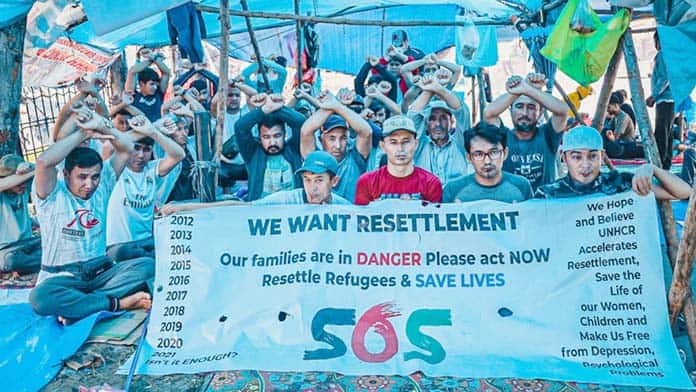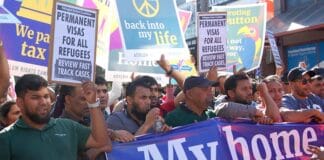Labor says it will lift the ban on accepting refugees in Indonesia. But action is needed urgently to resettle thousands left for a decade in impossible conditions, writes James Supple
Thousands of refugees are stranded in Indonesia, destitute and in growing despair.
This is the result of Australia’s ban on resettlement under the Coalition government—meaning Indonesia is effectively another offshore prison for refugees not that different from Manus or Nauru.
There are over 13,000 refugees and asylum seekers in Indonesia registered with the UNHCR, the UN refugee agency. This has more than doubled from 6000 in 2012 because there are few hopes of any pathway to resettlement.
Life for refugees in Indonesia is almost impossible to bear.
Indonesia is a poor country and therefore does not offer permanent resettlement or citizenship to refugees. As a result they have no right to work, can’t get a driver’s licence, and children are even barred from schools.
“It’s been ten years I have been in Indonesia,” Ali Frogi, a Hazara refugee from Afghanistan, told Solidarity. “I arrived when I was 17 years old and now I’m 26. I used to go to college and university to study, but they took that opportunity away here.
“In the past two decades Hazaras [in Afghanistan] have been targeted by the Taliban and also ISIS. There is an ongoing genocide against Hazaras—in the past few months a school was bombed, a mosque was bombed and about 700 Hazaras were killed and injured.
“We have been killed for decades in Afghanistan by terrorist groups, but the same thing is happening in Indonesia in a [different] legal way, they torture us daily until we are destroyed. They stopped me from living and put me in a cage.”
Around half of the refugees there get a meagre allowance of $100 a month provided through the International Organisation for Migration (IOM), which also provides some refugees with basic, overcrowded accommodation.
Even with the allowance, Ali said, “I struggle just to manage to eat just once in a day. They pay you $100 for a month, for food, clothes and everything. Can you live like that for ten years?”
Others receive no financial help at all and are forced to live on the streets. This is the result of Australia cutting off financial assistance for anyone who arrived after March 2018—a move designed to punish refugees and drive them into complete poverty.
No future
More than half of the refugees in Indonesia are from Afghanistan, many of them Hazaras who face persecution from the Taliban.
The return of Taliban rule last year means they cannot go home. There are other large groups from Somalia and Myanmar.
In the whole of last year just 468 refugees were resettled from Indonesia to third countries.
At this rate it would take 28 years for all of those there to gain resettlement.
This is just one example of the hopeless state of refugee resettlement at a global level.
The UNHCR says there are around 21 million refugees globally. Even before the pandemic, only 63,700 were resettled globally in 2019, just 4 per cent of the 1.5 million in urgent need of resettlement. And countries tend to pick and choose who they will take, based on language and employment prospects.
The resettlement system is not an orderly queue but a ticket in a lottery.
Many refugees in Indonesia have been stranded there for a decade or more. As a result there is growing desperation.
“All of the 13,000 refugees here have mental [health] problems, they are damaged physically, emotionally and mentally”, Ali said.
“Sixteen refugees have committed suicide because of their situation,” since 2013.
Refugees have staged big protests outside the offices of the UNHCR and IOM, often camping overnight to expose the fact they are left homeless.
In November an Afghan refugee, Ahmed Shah, set himself on fire during a protest outside the IOM in Medanon, after five years in Indonesia had driven him into severe depression.
At least two dozen refugees have made similar attempts to burn themselves.
“Refugees started to protest back in 2017 when lots of refugees were inside the Balikpapan camp, because they had been behind bars for four and five years after being recognised as a refugee. The [official] rules are that after you get refugee status you should be released into the community,” Ali said.
“The [authorities] cut the electricity and water to force the refugees [to stay locked up] inside as long as they could.
“Now if refugees arrange a protest march local gangs often attack the refugees while the police watch.
“Police also often beat refugees too. A few months ago [in January] refugees were attacked by local police in Pekanbaru which resulted in many refugees being hospitalised.
“Two weeks ago the new Prime Minister of Australia came to Indonesia and visited Makassar where I live. On that day refugees were locked in and guarded by local police and immigration officers so that refugees could not go out.”
Australia’s responsibility
This inhuman situation in Indonesia is mainly the result of Australia’s ban on resettlement. The Australian government is literally condemning refugees there to death.
In the past Australia has been one of the most important resettling countries from Indonesia.
Most of those who arrive there are hoping to get to Australia, many of them with family ties to people already living here.
But Australia’s policy of refusing to resettle from Indonesia meant refugees had no choice but to try to get to Australia by boat. Between 2001 and 2009 Australia resettled 532 refugees from Indonesia, an average of less than 60 a year.
Under the last Labor government this briefly increased to around 600 refugees in both the 2010-2011 and 2012-2013 financial years.
When Scott Morrison was Immigration Minister in 2014 he banned resettlement completely, declaring it was part of sending the message that boat arrivals setting out from Indonesia would never reach Australia.
This proved more clearly than anything that the government’s concern in stopping the boats was never “saving lives at sea” as it claimed, but putting up the not welcome sign and refusing to accept refugees altogether.
If it had genuinely cared for the lives of refugees, it could have given them an alternative to getting on a boat by processing them in Indonesia and flying here those deemed to be refugees. Instead it banned resettlement.
Iranian refugee Cyrus has also been in Indonesia for almost ten years, since 2013 when the Australian government was pressuring Indonesia to stop refugee boats.
“Officials from Australia met us in Jakarta [with] one officer from UNHCR, one officer from Indonesian Immigration, and told us ‘don’t go by boat, we will help you, we will give you housing, stay here and [wait for the] legal process’,” he told Solidarity.
“I believed these international organisations and this process, but after ten years, what happened for me? Nothing.
“Now the UNHCR say resettlement is so rare, that we cannot resettle all of you. It may be you’ll have to stay here forever if you don’t agree to go back to your country.
“My situation is now so difficult. We lost my son because my pregnant wife could not get hospital treatment. My daughter only started going to school after she was 14 years old, only because a friend in Australia paid one year’s school fees. Now it is the new academic year I don’t know how I will pay for her books and school clothes.”
Resettlement
Even the government’s own Expert Panel report in 2011 recommended this, saying it should increase its intake “from the region” to 3200 a year.
Australia could afford to take far more.
Under its humanitarian program the Australian government selects a set number of refugees from around the world for resettlement.
The Coalition government cut Australia’s total annual intake by 5000 places a year to 13,750. And during the pandemic in both of the last two years, half the places in the quota were not filled.
The number of spare places over that period alone could clear the backlog of refugees stranded in Indonesia.
Labor has capitulated and now wholeheartedly supports the turnback of refugee boats as well as offshore detention.
But it has said it would give “appropriate consideration” to resettlement of those recognised as refugees in Indonesia by the UNHCR, implying it would overturn the ban on accepting them.
It has not given any indication, however, of how many refugees from Indonesia it might accept.
Refugee campaigners are calling on the new Albanese Labor government to commit to resettling all the 13,000 refugees in Indonesia.
This will be a key demand of refugee rights protests happening across the country in July. We need to step up the pressure on Labor to act.
“We need a safe place in Australia or another country, a home where you aren’t afraid that you might have to [escape where you’re living] and move all the time,” said Ali.






